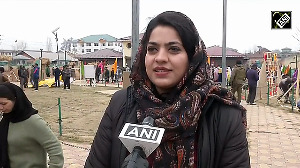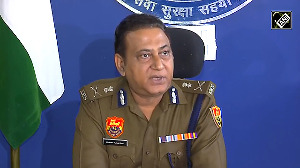 The government's flagship health insurance programme for the rural poor has drawn increasing appreciation from European and Asian countries.
The government's flagship health insurance programme for the rural poor has drawn increasing appreciation from European and Asian countries.
The National Health Insurance Plan for unorganized sector workers, which enables cashless treatment through use of biometric card, up to Rs 30,000, has elicited inquiries from European countries like Britain, Norway and Switzerland besides from Bangladesh, Nepal and Pakistan.
Planning Commission Secretary Sudha Pillai, who had introduced the Plan in 2007 when she was the Secretary of Labour Ministry, told PTI that the main inquiry from foreign governments relates to the key ingredients of the success story of the scheme without getting mired into corruption.
The Plan was incorporated in both the Railway and General Budgets this year. "It's profoundly satisfying to see the Plan being appreciated and incorporated in both the Railway and General Budgets," Pillai told PTI.
While in the railway budget, the Plan has been extended to all licensed porters, vendors and hawkers, the General Budget, noting the success of the scheme since its launch in April, 2008, proposed it to extend it to all Nrega beneficiaries who have worked for more than 15 days during the preceding financial year.
The Plan envisages cashless insurance cover up to Rs 30,000 including hospitalization and surgery. What sets the plan apart from other social sector welfare schemes is not only the user-friendly biometric system of smart card that can be used anywhere in the country but also that it offers a choice between public and private sector healthcare facilities.
Aiming to provide easy and quality healthcare to six crore below poverty line families, the plan has also reached 1.20 crore people and is gathering pace with each passing
year. It was only in January last year that maternity cases were included in the scheme. What also makes the scheme popular is the fact that the beneficiary pays just Rs 30 a year and the government doles out Rs 600.
How has the scheme come out triumphant when many previous social security schemes for the poor failed to deliver due to rampant corruption? It's the use of information technology that has ensured there is no pilferage and is very helpful for migrant labourers who travel from state to state in search of work, replies Pillai.
And yet just two years ago, it was not all that easy to push the scheme through. The biggest worry was how to involve other agencies many of which were reluctant to stick their neck out.
Workers in the unorganized sector make up nearly 94 per cent of the country's total workforce. The scheme has acted as a bulwark against one of the major reasons of indebtedness of the workers who had to fall back on moneylenders to foot their healthcare bill.
A study shows that while 23 per cent of the poor are indebted due to expenses on out-patient healthcare, on an average 52 per cent fall into debt trap due to hospitalization care, points out Pillai. Every time, a worker or his family member falls ill, he borrows money and slips into debt but Rashtriya Swasthya Bima Yojana has helped reversed that trend, she adds.






 © 2025
© 2025